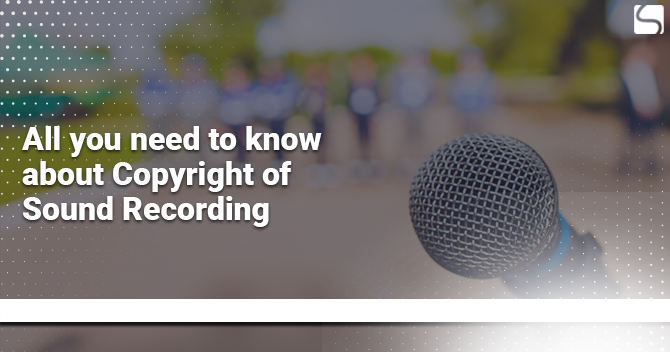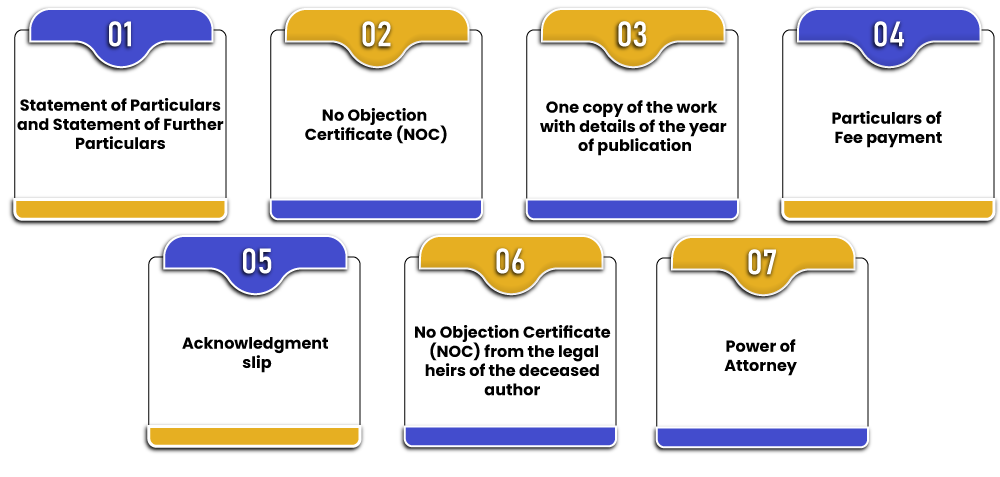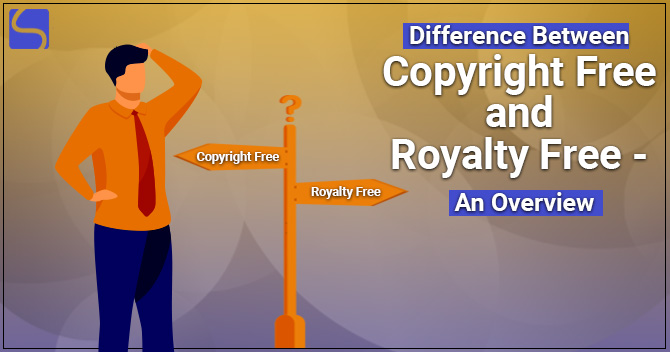All you need to know about Copyright of Sound Recording

Japsanjam Kaur Wadhera | Updated: Dec 29, 2020 | Category: Copyright
The Indian Copyright Act, 1957 provides the provisions for the grant of the copyright of original work. Copyright protects musical, artistic, literary, dramatic, architectural, cinematograph films, computer programs and sound recordings. Copyright in sound recordings is somewhat finite and limited than copyright in other works. This article will specifically talk about all that you need to know about the copyright of sound recordings.
Table of Contents
Prerequisites for Copyright of Sound Recording
- The Copyright of sound recording can be done easily but the prerequisite that requires is that the work must be original and must be reduced in such a way that whether it should be reduced in writing, or be printed or graphically produced or reproduced.
- The copyright of sound recording for an artist means the law wants the harmony of presentation or the combination of simultaneously sounded musical notes on individual elements consisting of various elements like duration, tone, timbre or voice to be expressed in a tangible form.
- The prerequisite for the copyright of sound recording is that the work must be first published in India. And the work that is unpublished, the owner must be a citizen of India at the time of making such work.
- The copyright of sound recording comprises of other elements such as sounds and lyrics. And for both the elements, two separate copyrights in the same work can exist, where each owner of the copyrighted work has the exclusive ownership over their specific work.
Criteria of Copyright of Sound Recording
- To copyright the sound recording the work must be “Original” and the original work needs to be submitted.
- The copyright of sound recording must permit the complete rights in licensing the work, allocation and restricting others from using such work.
- Another criterion of copyright of sound recording is that the creation must be in the tangible form.
- If the sound recordings are done by commissioning the singer or the lyricist, in the case of contractual terms, then the employer who authorizes the agent in said to be the first owner of the copyright.
Procedure to obtain Copyright of Sound Recording
When the owner obtains the copyright of sound recording, the owner establishes the legal claim over his original work. And it also performs as an important document for the public record of ownership. Copyright registration is important. It allows the person to sue any person who causes infringement by making the unlawful use of the work and also claim for the penal damages for the loss that occurred due to such reproduction of his work.
The procedure to obtain copyright registration of Sound Recording is explained below:
- The first step that requires copyrighting the sound recording is that the applicant is required to submit an application in Form XIV. The application consists of a Statement of Particulars and Statement of Further Particulars.
- The applicant is required to make individual applications for registration of each work.
- A 30 days mandatory cooling-off period starts on the receipt of the application, during which the objections can be filed in relation to the grant of such copyright.
- If any objects are raised, then such objections are scrutinized and a reply to the same is required to be given by the applicant. On hearing both the parties, the Registrar shall issue a Certificate of Copyright of sound recording.
Documents required for Obtaining Copyright of Sound Recording
The documents that are required for obtaining copyright of sound recording work are as follows:

- If the work needed to be given copyright is not original, a Statement of Particulars is required to be submitted along with the Statement of further particulars.
- The No Objection Certificate (NOC) is required to be submitted if the copyright application is being filed by any other person on behalf of the author.
- One copy of the work is required, in both the cases whether published or unpublished along with the details of the year of publication.
- Particulars of Fee payment
- A copy of the Acknowledgment slip
- If the author is deceased then the No Objection Certificate (NOC) from the legal heirs of the deceased author in favour of the applicant is required to be submitted.
- If the application is filed by a Lawyer then a Power of Attorney is required to be submitted by the applicant.
The Benefits of Copyright of Sound Recording
Copyright of Sound Recording is a legal Declaration, which is used to convey the rights that the owner holds over his work. The owner can acknowledge the ownership of copyrighted work, once the copyright of sound recording is obtained. Therefore, it is necessary for an individual to register for a copyright license to protect its work. The benefits of the copyright of sound recordings are:
- Protection to various elements such as sound, the composition of music, lyrics, recording the sound recording on tape etc is provided.
- The rights existing in sound recording can be assigned, licensed and reassigned.
- The owner has the copyright of sound recording can keep the work in any mode and as well as reproduce it.
- The owner has a right to make any modifications in the work and also perform the work in public.
- The owner has a right to take legal action and sue the person who is using his copyrighted work unlawfully and can bring him to the court for breaching the copyright.
- The owner also has a right to have his name published in all copies of his work, once he has the copyright of sound recording.
- The Copyright Act prohibits and restricts the misrepresentation and modification of the original work of the owner.
Conclusion
To have the protection and obtain the benefits on producing original work, the author or the owner of such work must get his original work copyrighted under the Indian Copyright Act, 1957[1]. For the owner to get copyright of sound recording, it is necessary for him to follow all the rules and regulations of the Act to seek protection. The duration of the copyright protection of sound recording published is within the lifetime of the author until sixty years from the beginning of the calendar year next following the year in which the author dies.














